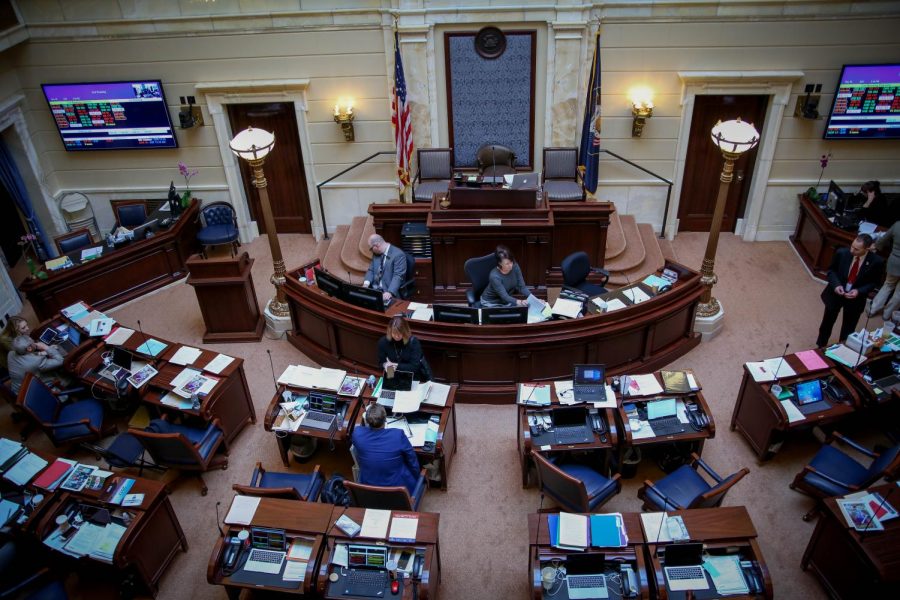Cushman & Kincart: Fund the Utah State Legislature
Legislative meeting at the Utah Capital building in Salt Lake City, Utah on Friday, Feb. 23, 2018. (Photo by Cassandra Palor | Daily Utah Chronicle)
November 11, 2021
In February 2021, when Utah had extra revenue, 34% of Utahns wanted it to be spent on education and another 28% said all wage earners should receive a tax cut. But we should have considered using this surplus to better fund our legislative session.
Utah’s session is uniquely short as it runs only 45 days. Our legislators spend the rest of the year living not as politicians, but regular Utahns who don’t serve their constituents. And the session’s supporting legislative staff mostly consists of undergraduate college interns rather than professionals or policy experts.
We need well-resourced legislators to develop more effective policy solutions — and we can do this through more funding. To better serve Utahns, we need a more funded legislature that would be less reliant on lobbyists and an effective check on the executive.
The Job of a Legislator
Our representatives do a lot more work than simply show up and vote on bills. They attend committee meetings, write and amend legislation, and, most importantly, they learn about the bills they’ll vote on throughout the session.
Utah legislators must do most of that work during Utah’s short 45-day session with a staff made up of undergraduate interns, most of whom have minimal policy experience. Josh McCrain, assistant professor of political science at the University of Utah, said in an interview how time and resource constraints make it difficult for legislators to do their job. “That’s even true in Congress, which is one of the most professionalized legislatures in the world.” In states like Utah, with a much less professional legislature, our representatives are essentially tasked with the impossible.
Interning with the legislature allows college students to gain policy-making experience and gives legislators staff to help them meet their obligations. Still, it doesn’t adequately substitute what a professional legislative staff would give our representatives.
Student interns don’t always have the knowledge to perform all the staffing needs of legislators. In an interview, Dallas Blackburn, a former intern for Utah’s legislature, talked about his experience bill tracking and not always understanding the legislation he needed to report back on. He said, “[The Utah Legislature] wouldn’t function without the interns.” But those interns don’t have half the knowledge a more professional staff and better resources could offer.
Lack of Resources Leads to Lobbying
A better-funded legislature could also help policy makers rely less on lobbyists. Sixty-six percent of Utahns believe lobbyists have “a great amount” of influence on the legislature, an accurate assessment. When states such as Utah have less professional legislatures, they rely on legislation provided by outside groups. Conversely, when legislators have a better policy foundation, lobbying techniques must be better researched to persuade the legislators.
Professor McCrain said, “Usually lobbyists fill in the expertise gap that’s created by under-resourced legislators.” This holds true to the experience of Blackburn, as he said “If [my legislator] didn’t know what a bill was, but an interest group [that he aligned with] supported it, he was more inclined to support it.”
McCrain further explained that states with “less professional legislatures introduce more model bills, so bills written specifically by outside interests.” This presents a problem, as many lobbyists have special interests. Some even make six-figure salaries representing client interests which do not always align with constituent policy priorities.
Checking the Executive
A more powerful legislature has the potential to more effectively check and balance in government. Evidence shows that a more powerful legislature creates a stronger democracy by constraining the executive more effectively.
Constitutionally granted powers support legislatures through institutional means. While it isn’t feasible to change institutional features of legislatures, we can grant them more funding so they have more policy-making resources. Empowering the legislature becomes more critical in Utah, which demonstrates one-party dominance in government.
Research states that with less ideological diversity between branches of government, checks and balances are less effective. Utahns overwhelmingly believe in small government. A more powerful legislature can help ensure our executive leaders do not reach outside the scope of their office, maintaining the small government that matters to us.
This may be an unpopular idea, as Utahns don’t want to give their money to funding the government. But, the surest way to increase governmental efficacy is through funding the legislature. We must make having a well-resourced legislature a policy priority.









